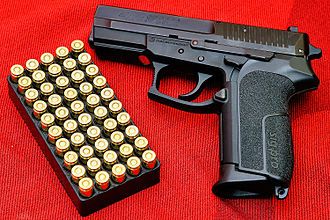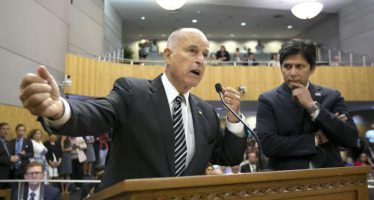CA bill aims at home guns

 Proposed gun control legislation often appeals to a sense of public fear. Playing on worries about lone nuts and random killings, gun control groups like former New York City Mayor Michael Bloomberg’s Everytown organization seek to tighten gun restrictions with an appeal to safety in the public square.
Proposed gun control legislation often appeals to a sense of public fear. Playing on worries about lone nuts and random killings, gun control groups like former New York City Mayor Michael Bloomberg’s Everytown organization seek to tighten gun restrictions with an appeal to safety in the public square.
A new California bill takes a different approach. Assembly Bill 1014 is by Assembly members Nancy Skinner, D-Oakland, and Das Williams, D-Carpinteria. It presumes the best place to exercise gun control is in the home.
Rather than leaving safe gun usage up to families, the bill allows family members to request that law enforcement and the courts prevent allegedly disturbed loved ones from owning or possessing firearms. Opponents insist the bill could restrict Second Amendment gun rights.
A new method of disarmament
The mechanics of the bill are fairly simple, although they also raise significant questions about the burden they place on the legal system.
Under the scenario imagined by the bill, an immediate family member of someone with a gun accuses them of posing “an immediate and present danger of causing personal injury to himself, herself, or another” with the gun. Moreover, the family member believes that taking away the gun is “necessary” to prevent that likely injury. The family member would then petition a judge for an “emergency gun violence restraining order,” which would be served by a law enforcement officer.
AB1014 is, however, more complicated than that. Although proposed language has been discarded that would enable licensed health care providers and therapists to petition a judge for a gun violence restraining order, law enforcement officers would be allowed to initiate a petition on their own. That scenario would arise, for instance, if an individual were detained or held by law enforcement on a charge or suspicion unrelated to gun possession.
If an officer discovered that the individual owned or possessed a gun, and determined on their own to petition to disarm the individual, the officer could ask a judge to do exactly that, and then serve the judge’s order on the individual.
The legal standard AB1014 would apply to this process is “reasonable cause” — a relatively loose and generous standard of evidence. Rather than having to show “beyond a reasonable doubt” that the gun-owning individual posed an immediate and present danger of gun-related personal injury, officers would simply have to persuade a judge that gun confiscation and restraint was not unreasonable under the circumstances.
On-call judges
By creating a new crime and intimately involving judges in its basic operation, AB1014 would put substantial additional burdens on the California judiciary. An officer would have to file a copy of the emergency gun violence restraining order with the court, as well as ensure that the order was added to the Department of Justice’s computer database of protective and restraining orders.
What’s more, extra work would be created for the presiding judge in each California county’s Superior Court. That judge would have to “designate at least one judge, commissioner, or referee to be reasonably available to issue orally, by telephone or otherwise, emergency gun violence restraining orders at all times whether or not the court is in session.”
It’s not exactly clear what it means to be “reasonably available” — or what happens in the event that a designated judge is not around. It is apparent, however, that designated judges — one or more in each California county — would generally be required to be on call.
A recipe for unintended consequences
That raises additional questions. AB1014 is inspired by the seemingly common-sensical notion that family members know best when their loved ones are a danger to themselves and others. As written, however, AB1014 could trigger a host of unintended consequences.
A busy, overburdened, or tired judge could take a more permissive attitude than appropriate toward granting restraining orders. A designated commissioner or referee, who is not a judge, could defer unduly to law enforcement officers issuing petitions.
Judges and officers alike could routinely err on the side of over-enforcement, not wishing to be held responsible for failing to take a gun away from someone who later uses it in a way that does cause personal injury.
Constitutional issues
AB1014 also has raised Second Amendment issues with gun-rights groups, who contend the process would establish unconstitutional star chambers, with the accused not having a day in court to refute the charges. Charged Brandon Combs, president of the California Association of Federal Firearms Licensees:
“Good intentions do not make a law constitutional and this bill is plainly unconstitutional. People cannot be denied their constitutional right to acquire and possess firearms based on secret proceedings.
“The anti-gun elected officials in Sacramento don’t care if it takes us decades and millions of dollars to overturn the awful and unconstitutional laws they pass. They’re only concerned with furthering their oppressive Big Brother agenda.”
“That’s why gun owners need to step up and stand together in fierce opposition to AB1014 every day until it’s dead.”
Opponents also contend that the law could be used by vindictive family members to attack non-violent members in custody or other disputes.
Supreme Court
Since the 2008 Heller decision involving the District of Columbia, the U.S. Supreme Court has roundly rejected state and local restrictions on gun ownership. And just on July 26, the Associated Press reported:
“A federal judge struck down the District of Columbia’s ban on carrying guns outside of a person’s home, concluding it violates Second Amendment rights.
“The ruling from U.S. District Judge Frederick J. Scullin is the latest in a protracted fight over gun laws in the District.”
The judge’s decision cited Heller.
AB1014 is unique in its approach to gun control. But its mechanics will likely raise more questions then they answer about how to prevent arbitrary and excessive enforcement.
Last year, Gov. Jerry Brown signed 11 gun control bills into law, vetoing seven others. Even if the Legislature in Sacramento votes through the bill, it may encounter a serious obstacle at the governor’s desk.
Related Articles
Accusations fly over volatile CA gas prices
In an unusual exercise of power, California lawmakers in the state Senate launched a preliminary probe into the recent spike in
Study questions whether fracking causes earthquakes
essay writing online A new 2013 study conducted by the University of Durham in the United Kingdom dispels the
GOP legislators unlikely to pay price for cap-and-trade vote
SACRAMENTO – As the California Legislature approached a late-night Monday vote to extend the state’s climate-change-fighting cap-and-trade system, the Capitol




